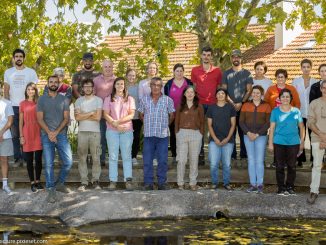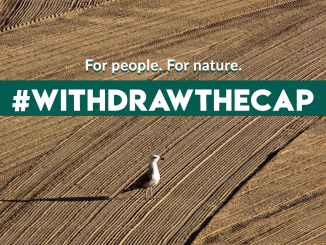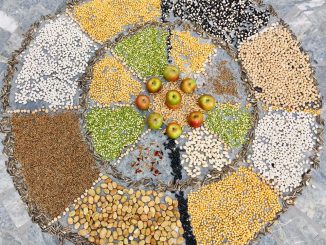The food environment, a shift towards vegetables, and true cost true prices. There are the themes our colleagues in the Dutch Food Transition Coalition focused on in a submission on sustainable food systems in the EU. Formally, this was on the Inception Impact Assessment of the Commission for the Framework for sustainable food systems. You can read an adapted version of the Dutch submission below, written by Willem Lageweg (director) and Joost de Jong (strategic advisor) Dutch Food Transition Coalition.
External costs of food systems need to be reduced
“A recent analysis by BCG for Germany shows that the external costs of greenhouse gas emissions by the German food sector alone amount up to 40 bln. EUR/year, while biodiversity losses would add up to 50 bln. EUR/year in an even conservative estimate” . With this issue, the Dutch Food Transition Coalition request the European Commission to focus on the external effects of the food systems. This pledge is made in their reaction on a preparatory consultation on a ‘Framework Sustainable food systems’ (1).
In the ‘From farm to fork strategy’, the Commission has announced to publish a Framework for sustainable food systems in the 4th quarter of 2023. In October this year, they requested opinions for the preparation of this framework.
As the Dutch Food Transition Coalition, we strive towards ‘healthy living on a healthy planet’. In other words: a food system that enables everyone to enjoy high quality, mainly plant based diets, and in which farmers are paid for producing high quality food, respecting biodiversity, reducing GHG and developing circular and regenerative agriculture. Thus protecting natural resources, saving space and respecting nature, and limiting the use of animals to a level that matches the requirements of circular systems, while maintaining high animal welfare standards.
In the current food system, food prices do not reflect the true costs (environmental, health, societal), nor the societal values that are or can be created. Unhealthy and unsustainable food is too cheap, too readily available, and consumption is stimulated by (aggressive) marketing (campaigns). This results in an unhealthy and unsustainable food environments (the environment in which consumers are confronted with food in multiple ways, and that influence their consumption decisions to a large extent).
For a transition to more sustainable food systems, the external costs need to be reduced. A shift to more plant-based diets and an improvement of the food environment are key elements in such a transition strategy.
True costs and true prices in EU food and agriculture policies
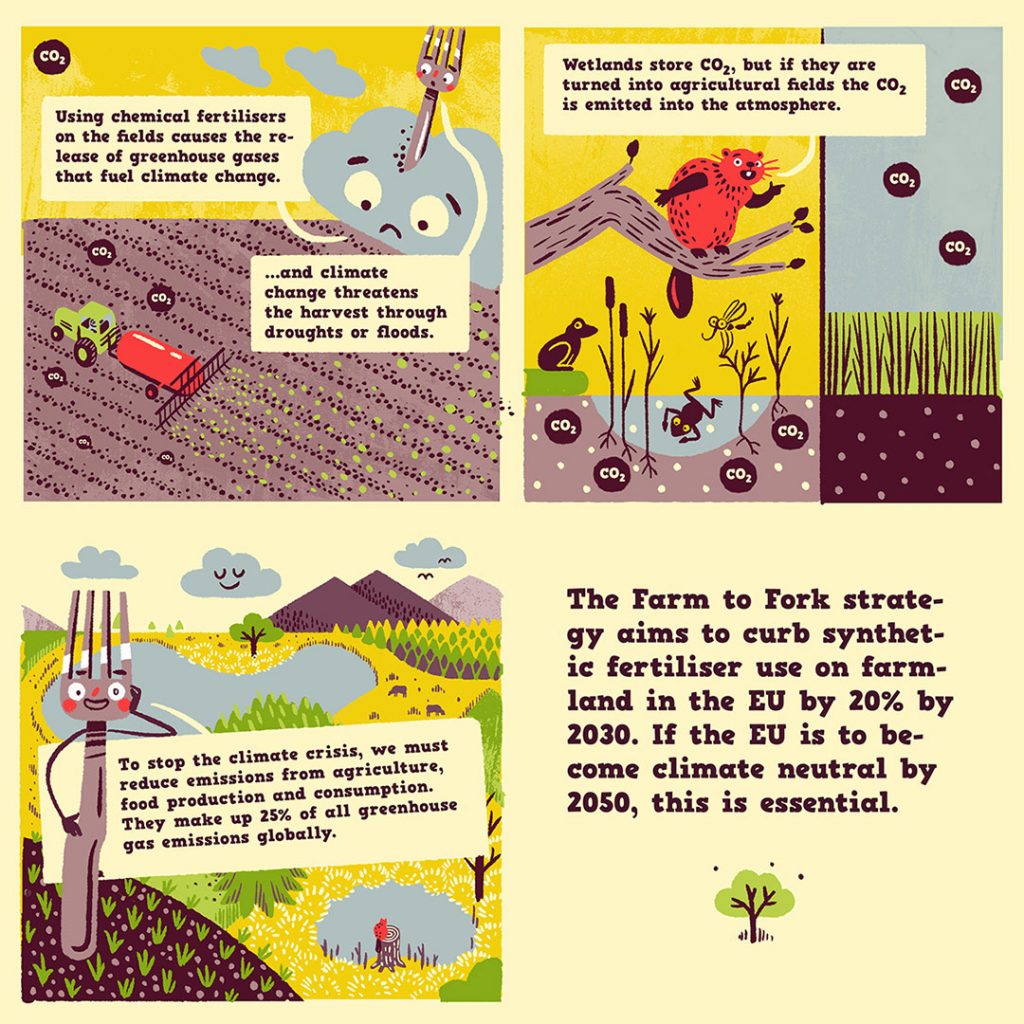
It has long been known that markets do not always reflect the true scarcities, particularly when so-called external effects are involved. Some recent analyses show that this is particularly true for agriculture and food systems. These external effects comprise a vast array of impacts such as biodiversity loss, climate change, animal welfare issues, health problems, landscape deterioration and others, causing damage to other actors than those involved in the market transaction. Hence the term ‘external’. This leads to welfare loss.
Unabated externalities may also lead to societal turmoil when an external effect at a certain moment exceeds the limits of sustainable use of a resource, and politics will be increasingly under pressure to take measures that then meet heavy resistance. A more gradual and smooth way to lower the external costs will be a more acceptable one than sudden interventions, as it gives actors time to readjust their practices. Internalizing external costs by following a predictable pathway is a good strategy for doing so.
In energy and transport, the principle of internalizing externalities has long been in place to give guidance to policy interventions. ‘Getting the prices right’ was the title of a long-lasting campaign in and with the transport sector. The European Commission has played a pivotal role, by launching several studies, by commissioning a regularly updated handbook on external cost calculations, and by including internalization strategies in directives for implementation in the Member-States.
Approaches for estimating and internalizing external costs (under a variety of terms like true costing, true pricing, full cost accounting and more) are getting more and more attention in the world of agriculture and food systems. Unsurprisingly so, since the impacts of food and agriculture systems on various goals and values is enormous, and the notion is rapidly growing that system changes (‘transition’) are needed to create a future that enables healthy living on a healthy planet (as the Dutch Food Transition Coalition summarizes its mission).
We advocate the preparation of a EU Framework agriculture and food external effects strategy that may comprise:
- A general vision of the future of agriculture and food systems in the light of current externalities and the need to develop towards a positive impacts system
- Methodological guidance for calculating external effects, on various levels (product, value chain, landscape, state), a.o. by extending the current EU handbook on externalities with agriculture and food specific parameters
- Development of instruments on EU level, for issues that cannot (easily or sufficiently) be regulated by Member-States
- A policy framework for national policies to be implemented by Member-States in their national laws, providing guiding principles for national regulations, tax schemes and other instruments that are national competences. In case of revenues from taxes, suggestions can be made to use these revenues for lowering other costs, e.g. the costs of labor, and/or for reducing the price gap between virgin and recycled resources, thus contributing to a more circular economy.
Such a strategy may be eventually converted into a directive.
As a first step, we propose to make an inventory of international true cost/true pricing-related initiatives and analyses, and an assessment of the strong and weak points and lessons learned of the variety of methods and approaches in use. We specifically advocate a role for innovative sustainable bottom-up approaches, as they are paving the way for new thinking and new practices that not only avoid negative external effects, but also include external benefits.
The shift to more plant-based diets.
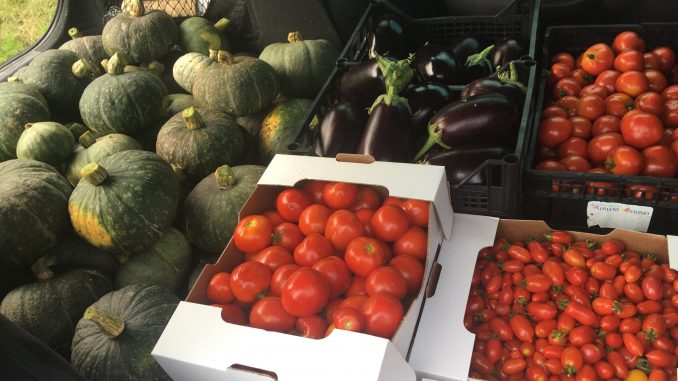
In most European countries people are eating unhealthily. E.g. too much meat and not enough fruit and vegetable. For health and environmental reasons, it is important to eat less meat (especially less beef and processed meat www.wcrf.org ). We expect from the Impact Assessment that different options for the reduction of meat consumption will be assessed. From legislation on the commercials for meat consumption and stimulating plant based eating patterns to higher prices for meat (fiscal measures, tax shift).
The production of meat has many environmental effects (biodiversity loss, land use, use of natural resources, greenhouse gases, nitrogen-, phosphate- and ammonia emissions, etc.).
Emissions of greenhouse gases and nitrogen in agriculture and food are unpriced now and mainly caused by the animal industry/production of animal based foods. For separate Member States it’s difficult to introduce taxes for these emissions. We need an European Framework to introduce these taxes or other forms of financial regulation such as emission trading schemes. As long as polluters are not charged for polluting the environment, there are not enough incentives to change their business and business models. The relatively weak incentives for sustainable consumption and production that markets are implementing voluntarily are not enough.
Food environment
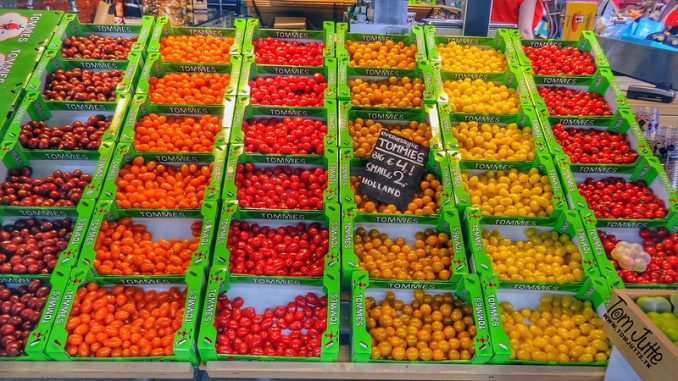
Many studies show the lack of a healthy food environment. We live in unhealthy and unsustainable food environments.
The purpose of public health nutrition policies, also the Farm to Fork strategy is to create food environments in which the sustainable and healthy option is the easy option, the most affordable option and the default. The goal should be to empower people in making healthy and sustainable choices, not to restrict them. Our principle: make healthy and sustainable food environments the new normal.
We need a European code for a healthy food environment:
- Clear goals for a balanced offering of healthy products (with a minimum share of products that meet the dietary guidelines) in supermarkets, restaurants, catering, and other food outlets
- Clear goals for a balanced offering of animal based and plant based proteins (60/40 plant based / animal based)
- A European public procurement standard for healthy and sustainable, mainly plant based catering.
- Challenging the Member States to realise better urban planning, limiting the number of outlets selling unhealthy food and stimulating the offering of plant based and healthy food
- Marketing rules:
- No marketing other than in balance with the dietary guidelines and no marketing of unhealthy/highly processed or highly unsustainable (e.g. high environmental impact) foods in public spaces;
- No marketing to children of unhealthy food
- No public support for (the marketing of) unhealthy / unsustainable products.
- An European Regulation for the composition of food. General rules on the quantity of sugar, salt, proteins and fats in products and ultra-processed food.
- Support Member States to introduce taxes on the unhealthy composition of food and on high environmental impact-foods.
For meat and sugar, we need a meat and sugar tax on European level. Developing harmonised European guidelines for healthy and sustainable diets would provide opportunities for public authorities to stimulate healthy and sustainable food consumption by public procurement or by creating a healthy and sustainable food environment.
The European Union would have an added value by introducing a harmonised approach because individual Member States are reluctant to start with legal measures due to the open markets.
Due to the principles of subsidiarity, we expect the Commission to develop a framework with general targets concerning food environment, where the Member States are challenged to improve the food environment in their country with a good monitoring and reporting system. In the Netherlands, the Dutch Food Transition Coalition supports a benchmark assessing the supermarkets’ sustainability and health efforts and develops a benchmark for catering. We should welcome impact assessment studies like this, to evaluate the effectiveness of different policy instruments to improve food environments. For example, higher prices for unsustainable and unhealthy food (and lower prices for fruit and vegetables). But also stricter regulations for marketing of unhealthy and unsustainable food.
Willem Lageweg, director of the Dutch Food Transition Coalition
Joost de Jong, strategic advisor of the Dutch Food Transition Coalition
(i) Sustainable EU food system –new initiative (europa.eu)
More on Food Systems
Farm to Fork Strategy: Ambitious, Realistic Innovation Pathway for the European food System
The EU finally has the makings of a sustainable food policy – why is it under attack?
EU Green Deal | Good Food Good Farming Campaign To Get Citizens On Board
The True Cost of Britain’s Addiction to Factory-Farmed Chicken






